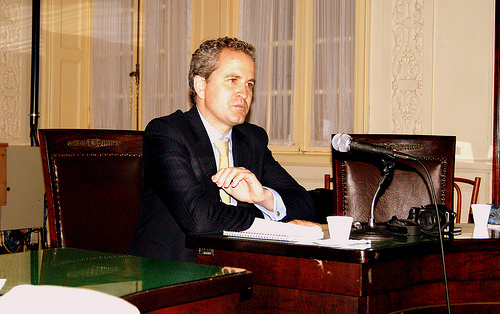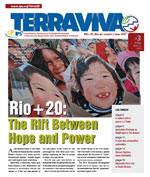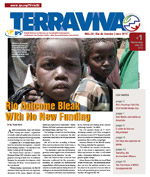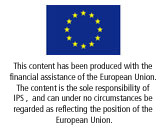Julio Godoy interviews JONATHAN BAILLIE, leading British biologist and member of the Zoological Society of London
RIO DE JANEIRO, Jun 18 (TerraViva) That the environmental state of the Earth is catastrophic is no longer news. But grasping some figures that describe this catastrophe still provokes a shock – for instance, that 30 percent of biodiversity has disappeared since 1970, and that 60 percent of this decline has taken place in the tropical areas of the planet.
Jonathan Baillie, a leading British biologist, member of the Zoological society of London, and head of the Edge programme for the conservation of species, has such alarming figures at the tip of his tongue.
Baillie, who is in Rio de Janeiro as scientific advisor to the GLOBE organisation of environmental legislators, told TerraViva that such figures serve as indicator of the dramatic state of the world’s environmental affairs.
Q: You paint a quite bleak picture of the global environment.
A: We as humanity are moving in the absolutely wrong direction. Our model of production and consumption is unsustainable, and the Earth cannot longer cope with it.
It is currently taking 1.5 years for the Earth to absorb the carbon dioxide produced and regenerate the renewable resources that people use within one year. If we continue to consume the planet’s resources at the same global rate, by 2030 we will need two planets to support the world’s population.
Q: What solutions do you envisage to deal with this unsustainability?
A: I’m afraid that only a major catastrophe, that would directly and massively affect people’s lives, would force us the make the changes needed to stop this decline. What we need is to take into account the natural capital into the national accounting systems and to use clean technology, to transform behaviours and patterns of production and consumption.
Q: New figures of the concentration of carbon dioxide in the atmosphere suggest that we may have reached a point of no return.
A: A recent measure of the concentration of CO2 in the Artic put it at 400 parts per million. This is a peak, a bad milestone, but it is still a punctual value. During the year, this value fluctuates, and eventually comes down. But this measure means that the acidification of the oceans reaches once and again a value that, if it were to remain constant, would lead to the obliteration of vital sea ecosystems.
Q: But it is not only marine biodiversity which is at risk.
A: No, not at all. Over 20 percent of mammals are endangered species. A similar share of invertebrates also suffers the risk of extinction. But the most endangered species are amphibians – some 32 percent of all amphibian species are listed as globally endangered. Almost half of all known amphibian species are declining.
Q: So what solutions do you see as capable of reversing this worrisome situation?
A: We absolutely need to incorporate natural capital value into the national accounts systems, to factor the ecosystems and its use into the measured gross domestic product. We absolutely need to put in application clean technologies, such as renewable sources of energy, to substitute the old, polluting ones.
Q: What do you mean by natural capital?
A: For instance, rough estimations of the costs caused by deforestation put them at 4.5 trillion U.S. dollars per year. Such values, which include capture of carbon by forests, the forests’ recreational value and the like, are not taken into account when calculating gross domestic product.
Q: By clean technologies you mean so-called bio-engineering, to try to reduce acidification of ocean waters?
A: No, not at all. We certainly need to try all technologies available, but the artificial manipulation of marine water chemistry is certainly not a solution.
Q: Are you pessimistic about the future of the Earth?
A: I believe that only the action of younger generations can force governments to finally comply with their own commitments. Younger generations will endure the consequences of the present omissions and misguided policies. Therefore they have to forcefully demand governments to take actions in the right direction, to stop depletion of biodiversity and other natural resources.








 Add to Google
Add to Google







